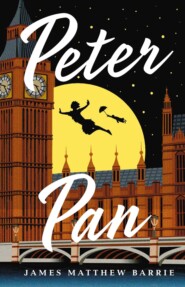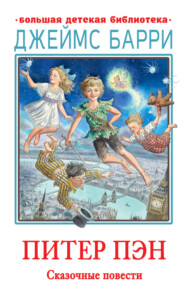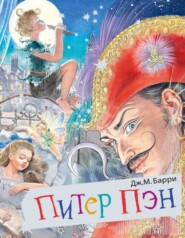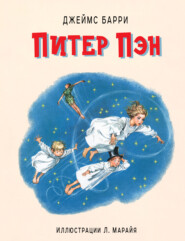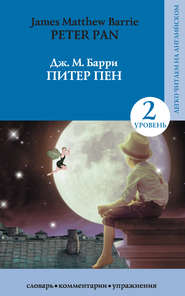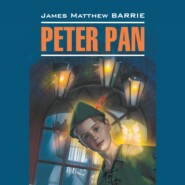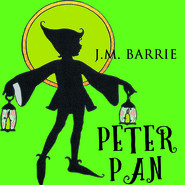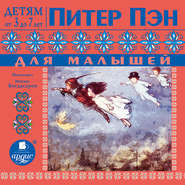По всем вопросам обращайтесь на: info@litportal.ru
(©) 2003-2024.
✖
When a Man's Single: A Tale of Literary Life
Автор
Год написания книги
2017
Настройки чтения
Размер шрифта
Высота строк
Поля
Mary stamped her foot.
'How dare you, Mr. Angus?' she exclaimed.
Rob's chest heaved.
'You must do as you are told,' he said.
Mary looked at him while he looked at her, but she did not take off the shawl again, and that was the great moment of Rob's life.
The others had gone on before. Although it was a white night the plank was dark in shadow, and as she stepped off it she slipped back. Rob's arm went round her for a moment. They walked round the island together behind the others, but neither uttered a word. Rob was afraid even to look at her, so he did not see that Mary looked once or twice at him.
Long after he was supposed to be in the hotel Rob was still walking round the island, with no one to see him but the cow. All the Chinese lanterns were out now, but red window-blinds shone warm in several house-boats, and a terrier barked at his footsteps. The grass was silver-tipped, as in an enchanted island, and the impatient fairies might only have been waiting till he was gone. He was wondering if she was offended. While he paced the island she might be vowing never to look at him again, but perhaps she was only thinking that he was very much improved.
At last Rob wandered to the hotel, and reaching his bedroom sat down on a chair to think it out again by candle-light. He rose and opened the window. There was a notice over the mantelpiece announcing that smoking was not allowed in the bedrooms, and having read it thoughtfully he filled his pipe. A piece of crumpled paper lay beneath the dressing-table, and he lifted it up to make a spill of it. It was part of an envelope, and it floated out of Rob's hand as he read the address in Mary Abinger's handwriting, 'Sir Clement Dowton, Island Hotel.'
CHAPTER XIV
MARY OF THE STONY HEART
A punt and a rowing-boat were racing lazily toward Sunbury on a day so bright that you might have passed women with their hair in long curls and forgiven them.
'I say, Dick,' said one of the scullers, 'are they engaged?'
Will was the speaker, and in asking the question he caught a crab. Mary, with her yellow sleeves turned up at the wrist, a great straw hat on her head, ran gaily after her pole, and the punt jerked past. If there are any plain girls let them take to punting and be beautiful.
Dick, who was paddling rather than pulling stroke, turned round on his young brother sharply.
'Whom do you mean?' he asked, speaking low, so that the other occupants of the boat should not hear him, 'Mary and Dowton?'
'No,' said Will, 'Mary and Angus. I wonder what they see in her.'
They were bound for a picnicking resort up the river; Mrs. Meredith, Mary, and Sir Clement in the punt, and the others in the boat. If Rob was engaged he took it gloomily. He sat in the stern with Mr. Meredith, while Nell hid herself away beneath a many-coloured umbrella in the prow; and when he steered the boat into a gondola, he only said vacantly to its occupants, 'It is nothing at all,' as if they had run into him. Nell's father said something about not liking the appearance of the sky, and Rob looked at him earnestly for such a length of time before replying that Mr. Meredith was taken aback. At times the punt came alongside, and Mary addressed every one in the boat except Rob. The only person in the punt whom Rob never looked at was Mary. Dick watched them uneasily, and noticed that once, when Mary nearly followed her pole into the water, Rob, who seemed to be looking in the opposite direction, was the first to see what had happened. Then Dick pulled so savagely that he turned the boat round.
That morning at breakfast in his chambers Rob had no thought of spending the day on the river. He had to be at the Wire office at ten o'clock in the evening, and during the day he meant to finish one of the many articles which he still wrote for other journals that would seldom take them. The knowledge that Sir Clement Dowton had been to Molesey disquieted him, chiefly because Mary Abinger had said nothing about it. Having given himself fifty reasons for her reticence, he pushed them from him, and vowed wearily that he would go to the house-boat no more. Then Dick walked in to suggest that they might run down for an hour or two to Molesey, and Rob agreed at once. He shaped out in the train a subtle question about Sir Clement that he intended asking Mary, but on reaching the plank he saw her feeding the swans, with the baronet by her side. Rob felt like a conjurer whose trick has not worked properly. Giving himself just half a minute to reflect that it was all over, he affected the coldly courteous, and smiled in a way that was meant to be heart-rending. Mary did not mind that, but it annoyed her to see the band of his necktie slipping over his collar.
It was the day of the Sunbury Regatta, but the party from the Tawny Owl twisted past the racers, leaving Dick, who wanted a newspaper, behind. When he rejoined them beyond the village, the boat was towing the punt.
'Why,' said Dick, in some astonishment to Rob, who was rowing now, 'I did not know you could scull like that.'
'I have been practising a little,' answered Rob.
'When he came down here the first time,' Mrs. Meredith explained to Sir Clement, 'he did not know how to hold an oar. I am afraid he is one of those men who like to be best at everything.'
'He certainly knows how to scull now,' admitted the baronet, beginning to think that Rob was perhaps a dangerous man. Sir Clement was a manly gentleman, but his politics were that people should not climb out of the station they were born into.
'No,' Dick said, in answer to a question from Mr. Meredith, 'I could only get a local paper. The woman seemed surprised at my thinking she would take in the Scalping Knife or the Wire, and said, "We've got a paper of our own."'
'Read out the news to us, Richard,' suggested Mrs. Meredith. Dick hesitated.
'Here, Will,' he said to his brother, 'you got that squeaky voice of yours specially to proclaim the news from a boat to a punt ten yards distant. Angus is longing to pull us up the river unaided.'
Will turned the paper round and round.
'Here is a funny thing,' he bawled out, 'about a stick. "A curious story, says a London correspondent, is going the round of the clubs to-day about the walking-stick of a well-known member of Parliament, whose name I am not at liberty to mention. The story has not, so far as I am aware, yet appeared in print, and it conveys a lesson to all persons who carry walking-sticks with knobs for handles, which generate a peculiar disease in the palm of the hand. The member of Parliament referred to, with whom I am on intimate terms – "'
Rob looked at Dick, and they both groaned.
'My stick again,' murmured Rob.
'Read something else,' cried Dick, shivering.
'Eh, what is wrong?' asked Mr. Meredith.
'You must know,' said Dick, 'that the first time I met Angus he told me imprudently some foolish story about a stick that bred a disease in the owner's hand, owing to his pressing so heavily on the ball it had by way of a handle. I touched the story up a little, and made half a guinea out of it. Since then that note has been turning up in a new dress in the most unlikely places. First the London correspondents swooped down on it, and telegraphed it all over the country as something that had happened to well-known Cabinet Ministers. It appeared in the Paris Figaro as a true story about Sir Gladstone, and soon afterwards it was across the Channel as a reminiscence of Thiers. Having done another tour of the provinces, it was taken to America by a lecturer, who exhibited the stick. Next it travelled the Continent, until it was sent home again by Paterfamilias Abroad, writing to the Times, who said that the man who owned the stick was a well-known Alpine guide. Since then we have heard of it fitfully as doing well in Melbourne and Arkansas. It figured in the last volume, or rather two volumes, of autobiography published, and now, you see, it is going the round of the clubs again, preparatory to starting on another tour. I wish you had kept your stick to yourself, Angus.'
'That story will never die,' Rob said, in a tone of conviction. 'It will go round and round the world till the crack of doom. Our children's children will tell it to each other.'
'Yes,' said Dick, 'and say it happened to a friend of theirs.'
A field falls into the river above Sunbury, in which there is a clump of trees of which many boating parties know. Under the shadow of these Mrs. Meredith cast a table-cloth and pegged it down with salt-cellars.
'As we are rather in a hurry,' she said to the gentlemen, 'I should prefer you not to help us.'
Rob wandered to the river-side with Will, who would have liked to know whether he could jump a gate without putting his hands on it; and the other men leant against the trees, wondering a little, perhaps, why ladies enjoy in the summer-time making chairs and tables of the ground.
Rob was recovering from his scare, and made friends with Mary's young brother. By particular request he not only leapt the gate, but lifted it off its hinges, and this feat of strength so impressed Will that he would have brought the whole party down to see it done. Will was as fond of Mary as a proper respect for himself would allow, but he thought she would be a lucky girl if she got a fellow who could play with a heavy gate like that.
Being a sharp boy, Will noticed a cloud settle on Rob's face, and looking toward the clump of trees, he observed that Mary and the baronet were no longer there. In the next field two figures were disappearing, the taller, a man in a tennis jacket, carrying a pail. Sir Clement had been sent for water, and Mary had gone with him to show him the spring. Rob stared after them; and if Will could have got hold of Mary he would have shaken her for spoiling everything.
Mrs. Meredith was meditating sending some one to the spring to show them the way back, when Sir Clement and Mary again came into sight. They did not seem to be saying much, yet were so engrossed that they zigzagged toward the rest of the party like persons seeking their destination in a mist. Just as they reached the trees Mary looked up so softly at her companion that Rob turned away in an agony.
'It is a long way to the spring,' were Mary's first words, as if she expected to be taken to task for their lengthened absence.
'So it seems,' said Dick.
The baronet crossed with the pail to Mrs. Meredith, and stopped half-way like one waking from a dream. Mrs. Meredith held out her hand for the pail, and the baronet stammered with vexation. Simultaneously the whole party saw what was wrong, but Will only was so merciless as to put the discovery into words.
'Why,' cried the boy, pausing to whistle in the middle of his sentence, 'you have forgotten the water!'
It was true. The pail was empty. Sir Clement turned it upside down, and made a seat of it.
'I am so sorry,' he said to Mrs. Meredith, trying to speak lightly. 'I assure you I thought I had filled the pail at the spring. It is entirely my fault, for I told Miss Abinger I had done so.'
Mary's face was turned from the others, so that they could not see how she took the incident. It gave them so much to think of that Will was the only one of the whole party who saw its ridiculous aspect.
'Put it down to sunstroke, Miss Meredith,' the baronet said to Nell; 'I shall never allow myself to be placed in a position of trust again.'
'Does that mean,' asked Dick, 'that you object to being sent back again to the spring?'







